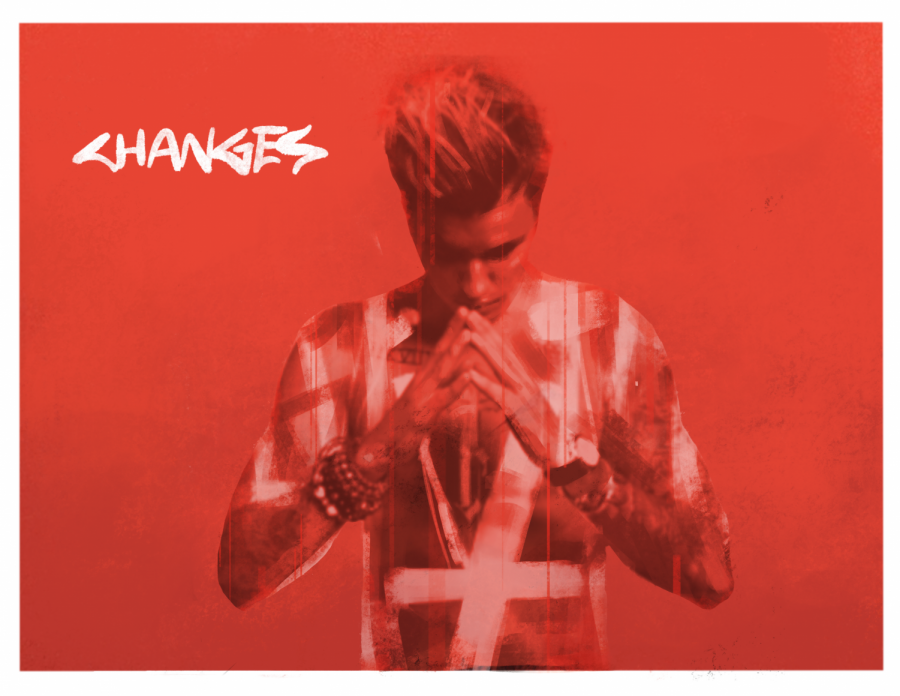Album review: “Changes” for the worse or the better?
An edit of Justin Bieber’s “Changes” and “Purpose” albums. “Changes” dropped on Feb. 14 with 17 tracks and six collaborations.
March 12, 2020
The year is 2010. In a Youtube video online, stage lights flood the arena, filling the screen, as electric guitars, bases and drums crash to the beat of the swelling music. The beat drops, and the arena pulses with the heartbeat of the thousands of fans in the audience, belting out the lyrics in unison to the boy onstage who stole their hearts away.
After his EP debut in 2009, teen heartthrob Justin Bieber quickly rose to fame, amassing a surging crowd of “Beliebers,” fanatics of then 13-year-old Bieber’s effortlessly stylish bedhead, euphonious pre-pubescent crooning, and the earnest energy of a rising mega-star, humble yet heartfelt.
His first EP, My World, serenaded the millions of broken teenage hearts, shooting him to the top 100 Billboards and earning him the coveted spot of boy crush dream.
Yet a decade later, the boy has become a man, and his childhood stardom has become common celebrity notoriety. As the years passed, his music began to reflect both the mental and emotional trauma he experienced, as well as his transformation of maturity.
Bieber’s newest and fifth studio album, “Changes,” is truly a change from the boy we once knew. But whereas his songs, boosted by his persona, used to be the newest, hottest toy on the block, his music itself no longer seems to receive its previous adoration and praise.
“Changes” dropped on Feb. 14 with 17 tracks and six collaborations with major artists. In a 90-second teaser dropped on Christmas Eve, Bieber stated that his newest album featured “the music that [he’s] loved the most out of anything [he’s] done.”
Bieber claims that his early years of stardom took a fall after becoming involved with drug use, calling his past as “crazy scary” in an episode of his Youtube series, Seasons, which documents Bieber’s past and reveals his return to the entertainment world with the release of “Changes” his first album after five years. Although Bieber dealt with a heavy addiction to various drugs, he dedicates a large part of his successful recovery journey to wife Hailey Beiber (nee Baldwin).
To an audience in London’s Tape nightclub, Bieber announced: “I spoke to [Hailey] this morning — she is in LA. This whole album is super-dedicated to her and my love for her, and hopefully, that translates.”
The grungy, edgy cover, featuring Bieber with his signature tattoos, eyes closed, and figure slightly hunched with a wash of grainy film-like red, and the word “changes’ ‘ in small, clean, graffiti-like lettering. From his drug incarceration and depression days, Bieber really does seem to have ‘changed’, reflecting his maturity and transformation into the lyrics of his new album.
Granted, the style of music is much more laid-back, neutral, and positive compared to previous albums such as “Purpose.” However, from an audience perspective, the album overall disappoints. The intent of the album exists, but the marketing does not. A number of the songs, such as “Intentions” seem to rely on repetition to form a catchy tune, creating a shallow perception of musicality and inducing boredom.
Similarly, title track “Yummy” seems not only shallow and generic but with a bland tune. Professing to the entire world his thoughts on his wife, who’s “got that yummy, yum,” is not only objectifying her, but is another example to his audience, a majority of whom are youth, of a radical problem in today’s society: gender inequality.
Along with Bieber’s change into a new person, transition into a new life, and his intent to translate that message to the world, so too changes the audience of pop music, who no longer see Bieber as the “it” idol. Although the release of “Changes” holds the earnest intentions of the young boy from the past, the music both fails to serve as a positive role model for youth nor does it resonate or communicate with its listeners. As a result, Bieber’s “Changes” seem to only have been a solo journey for Bieber, this time, alone and without his Beliebers.


















![“[Building nerf blasters] became this outlet of creativity for me that hasn't been matched by anything else. The process [of] making a build complete to your desire is such a painstakingly difficult process, but I've had to learn from [the skills needed from] soldering to proper painting. There's so many different options for everything, if you think about it, it exists. The best part is [that] if it doesn't exist, you can build it yourself," Ishaan Parate said.](https://harkeraquila.com/wp-content/uploads/2022/08/DSC_8149-900x604.jpg)




![“When I came into high school, I was ready to be a follower. But DECA was a game changer for me. It helped me overcome my fear of public speaking, and it's played such a major role in who I've become today. To be able to successfully lead a chapter of 150 students, an officer team and be one of the upperclassmen I once really admired is something I'm [really] proud of,” Anvitha Tummala ('21) said.](https://harkeraquila.com/wp-content/uploads/2021/07/Screen-Shot-2021-07-25-at-9.50.05-AM-900x594.png)







![“I think getting up in the morning and having a sense of purpose [is exciting]. I think without a certain amount of drive, life is kind of obsolete and mundane, and I think having that every single day is what makes each day unique and kind of makes life exciting,” Neymika Jain (12) said.](https://harkeraquila.com/wp-content/uploads/2017/06/Screen-Shot-2017-06-03-at-4.54.16-PM.png)








![“My slogan is ‘slow feet, don’t eat, and I’m hungry.’ You need to run fast to get where you are–you aren't going to get those championships if you aren't fast,” Angel Cervantes (12) said. “I want to do well in school on my tests and in track and win championships for my team. I live by that, [and] I can do that anywhere: in the classroom or on the field.”](https://harkeraquila.com/wp-content/uploads/2018/06/DSC5146-900x601.jpg)
![“[Volleyball has] taught me how to fall correctly, and another thing it taught is that you don’t have to be the best at something to be good at it. If you just hit the ball in a smart way, then it still scores points and you’re good at it. You could be a background player and still make a much bigger impact on the team than you would think,” Anya Gert (’20) said.](https://harkeraquila.com/wp-content/uploads/2020/06/AnnaGert_JinTuan_HoHPhotoEdited-600x900.jpeg)

![“I'm not nearly there yet, but [my confidence has] definitely been getting better since I was pretty shy and timid coming into Harker my freshman year. I know that there's a lot of people that are really confident in what they do, and I really admire them. Everyone's so driven and that has really pushed me to kind of try to find my own place in high school and be more confident,” Alyssa Huang (’20) said.](https://harkeraquila.com/wp-content/uploads/2020/06/AlyssaHuang_EmilyChen_HoHPhoto-900x749.jpeg)








